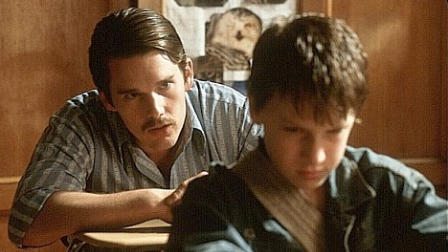Interesting enough, fans of Truffaut seem to still compare Frank Whaley’s “Joe the King” to the former director’s “The 400 Blows.” It becomes very clear time and again that Whaley doesn’t just love the movie, he expresses it by cribbing from many moments in said film, and uses this semi-autobiographical film as an opportunity to stage many scenes in the vein of “The 400 Blows.” The only difference is that while Truffaut staged some moments of hope and whimsy that could at least offer his character a glimmer of hope, “Joe the King” is a sour and bitter film from beginning to end, with no idea how to finish its arc.
Seeing as this is semi-autobiographical, you can pretty much assume that Joe grew up to be Frank Whaley, but the journey of Joe and his descent in to crime feels abrupt and incomplete. Director Whaley holds little to no remorse for the lower class life style, and paints it as a series of horrific dead ends, dooming anyone unfortunate enough to be born in to the world. Every single character in Joe’s life are mean, awful, and angry people with zero prospects. His father is the janitor for his school, his mom is prone to violent outbursts, and his brother is a lump who really does nothing. Most of the characters ride on their memories and broken dreams, which is very much reflected in a scene where Joe’s mother mourns her prized record collection, shattered after a scuffle.
It’s not so much the records she loves, as the remembrance of better times. Though Joe begins tangling with petty theft when we first meet him, he begins stealing more as a way of collecting his mom’s records again as a misguided gift of some kind. Even that’s depicted as a gloomy, harrowing journey with potential for violence, as he begins preying on his greedy bosses, looking for a bigger pay off every time. That said, Noah Fleiss is very good as the empathic Joe who is desperate for a change in his bad luck, and always seems to come up short. He’s a kid with no end of really bad breaks, and can only really find solace in the fact that he is shipped off in the finale.
While “The 400 Blows” depicted its character experience brief moments of happiness, Joe never really experiences anything here resembling glee. His days at work are thankless, and when he wreaks (a rather disgusting) revenge on a bully that beat up his brother, he can’t even take joy in that moment. Beyond Fleiss, the supporting cast is strong, including Ethan Hawke as a well meaning guidance counselor, and Val Kilmer as Joe’s violent drunken father whose complexities make him inadvertently more interesting than Joe. While it’s very flawed, “Joe the King” manages to still compel, with the tale of a boy in search of a silver lining, and the violent path that awaits him if he doesn’t step lively. Even with warts and all, “Joe the King” is a very worthwhile drama.

